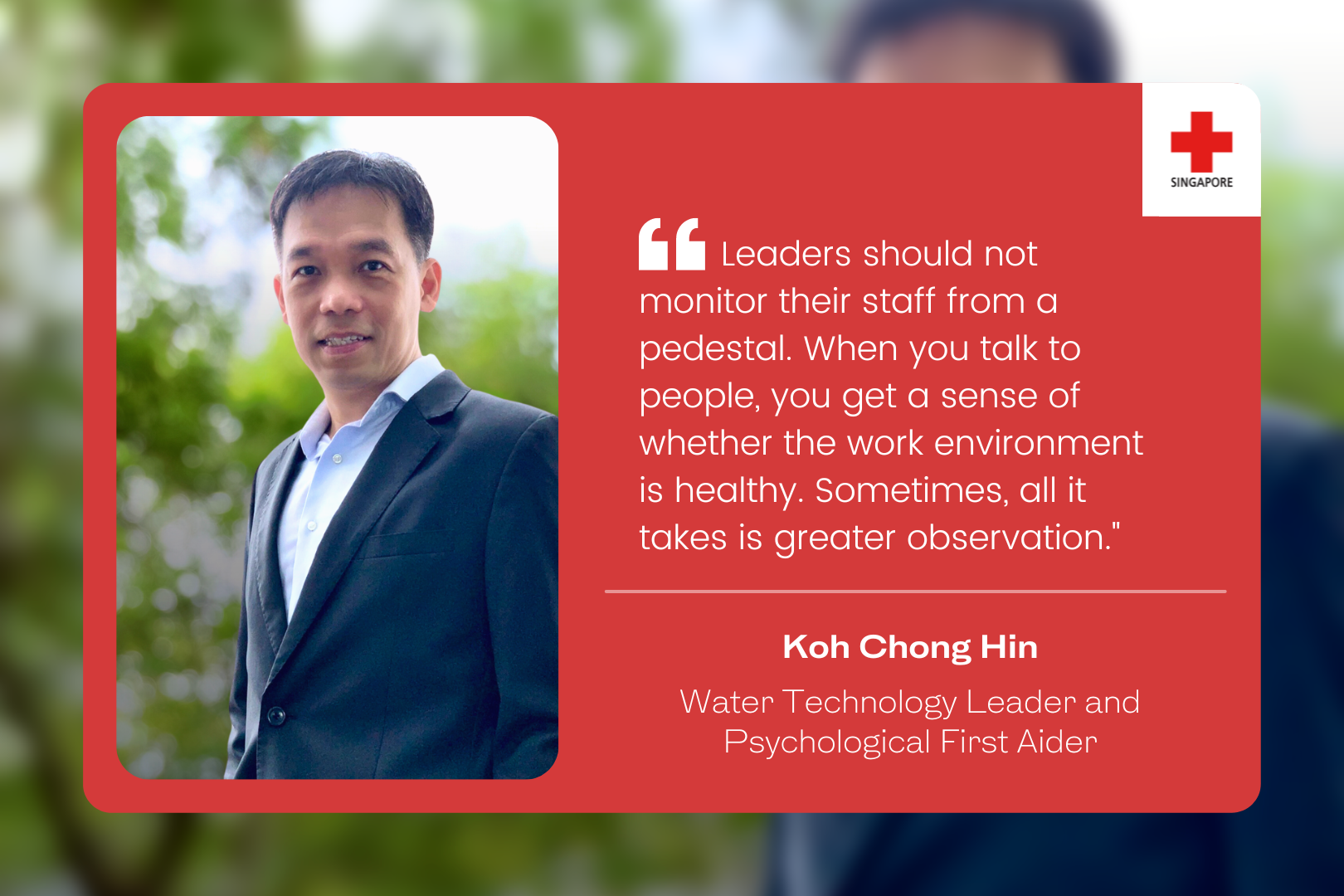
Koh Chong Hin is a Vice President of a firm specialising in water technology, but more importantly, he is a strong advocate for workplace mental health.
In a time when issues such as employee burnout and declining mental health are coming to the fore, Koh Chong Hin's unwavering commitment to promote mental wellness for the employees is timely and apt. He not only implemented, but championed the habituation of a three-pronged approach to enhancing mental wellness at the workplace.
Forging Strong Connections with Employees
Embracing a personalised approach, Chong Hin personally engages employees on-the-ground to better engage and understand them while identifying signs of mental distress.
Yet, with a workforce of 100 to 200 employees in his office, ensuring that each individual feels understood and engaged is no easy task. Following his Psychological First Aid training with the Singapore Red Cross Academy, he espouses mental well-being at the workplace by encouraging his managers to follow in his footsteps.
"Leaders should not monitor their staff from a pedestal. We must be on-the-ground, either at the office or the sites to experience what the employees are experiencing. When you interact with people, you get a sense of whether the work environment is healthy," he says.
He calls for managers to check in with the employees to identify signs of distress.
“Sometimes, all it takes is greater observation. One can usually tell how the employee is feeling. Behavioural signs include being more quiet than usual, or more agitated. Such telltale signals are unmistakable even on meetings online,” he says.
Conducting Regular Check-ins with the Employees
Organisations must recognise their custodian role in the larger community. As a forward-looking leader, he recognises that actively creating a psychologically safe workplace is the only sustainable way to grow the organisation. Chong Hin would often remind his employees not to focus merely on the business, but to practise self care as well.
Sales targets and other traditional performance indices should never be prioritised at the expense of the employees' mental well-being.
“When we overstretch people’s capabilities with a very heavy workload, mental stress issues may surface in the long run. It is integral not to place undue pressure on the employee to the point that they experience burnout,” he says.
Yet, balancing performance and workplace wellness is always a challenge, and Chong Hin knows this firsthand. Work, after all, is still work, and responsibilities will always come with having a job. However, he highlighted the importance of understanding the situation and assessing what needs to be done.
Based on his work experience, he shares that mental pressure can be alleviated by providing more supervision and support to ascertain if the targets are realistic and achievable. He also encourages managers to consider updating their objectives, including the extension of time if the deadlines cannot be met.
Tailoring Approaches to Motivate Different Employees
Cognisant that people are driven by different motivations, priorities, needs, and preferences, Chong Hin recommends that organisations tailor their approaches to motivate different types of employees, maximising their potential while moving the entire organisation forward.
"No two people can be managed the same way. Some are more interactive, while others prefer to be left alone. Some people are naturally more ambitious, while others prioritise family time and seek stability," he says.
CSR’s role in workplace mental health
Chong Hin deepens employee engagement through the company's corporate social responsibility (CSR) pillars that tie in closely with the core business.
“When employees see the direct impact of what we do, they feel connected to the mission, and this gives them a greater sense of purpose, which contributes to their overall wellbeing,” he says.
Besides being socially responsible, he is adamant about prioritising the employees' wellbeing.
“We must take care of our own people before taking care of others,” he says.
He emphasises that to do otherwise is hypocritical.
It is a bold statement, and an even bolder mission. Why, then, does this mean so much to him?
“When our employees are happy, they are in a better position to make our customers, and our community happy,” he says.
By Heidi Boon, Volunteer Writer
Copyedited by Stella Lim, Adele Tan, Sondra Foo, Marketing Communications and Partnerships and Carmen Wong, Centre for Psychosocial Support, Singapore Red Cross Academy
|
Inspired? Learn Psychological First Aid (PFA) and advocate PFA to your family and friends. |

